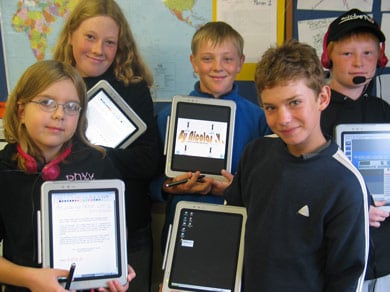I think Sherry Turkle gives a strong argument to that very quote in chapter eight. One main point in the theory that we are always on, always connected to media, the internet, and our socialnetworking is her focus on "Multitasking and the Alchemy of time". With The technology that we have today, an ipad can allow me to go from my social network apps to my school apps in two touches, and by just sweeping across the screen with four fingers I can swipe between apps that I have up which can be over twenty.
 Sherry Turkle said "when media are always there, waiting to be wanted, people lose a sense of choosing to communicate." As a college student I see this almost everywhere, people are completely fine, sitting by themselves in the cafe, or waiting in a lobby, as long as they have that connectivity, that smart phone, that tablet, that iPad, any device that allows them to connect to their other life online. Sherry believes that this is because our "cultural norms are rapidly shifting. This is because kids today, I think kids equate growing up with getting the new device that will allow then to connect with the other kids that have that device in their "online social community". She brings up another good Theory that "our networked devices encourage a new notion of time because they promise that one can layer more activities onto it" we see this in many different advertisement commercials as well. Sprint offers 4G and 3G smart phones and in this commercial ad they're showing you all thi things you could be doing almost simateaneously by being apart of their network and purchasing one of their networked devices.
Sherry Turkle said "when media are always there, waiting to be wanted, people lose a sense of choosing to communicate." As a college student I see this almost everywhere, people are completely fine, sitting by themselves in the cafe, or waiting in a lobby, as long as they have that connectivity, that smart phone, that tablet, that iPad, any device that allows them to connect to their other life online. Sherry believes that this is because our "cultural norms are rapidly shifting. This is because kids today, I think kids equate growing up with getting the new device that will allow then to connect with the other kids that have that device in their "online social community". She brings up another good Theory that "our networked devices encourage a new notion of time because they promise that one can layer more activities onto it" we see this in many different advertisement commercials as well. Sprint offers 4G and 3G smart phones and in this commercial ad they're showing you all thi things you could be doing almost simateaneously by being apart of their network and purchasing one of their networked devices.With this new "notion of time" it allows those people who have those devices to have these different devices to live in a what Sherry Turkle calls a "pauseable life". We see this almost everywhere, in the classroom, in restaurants, and even theme parks, people put their real life on hold to answer to their "connected" life. So "Why do we expect more from technology and less from each other", because we can do more. We can do anything these products have to offer from anywhere we want to do them at. With this accesisibility it is no wonder why we are "always on"

No comments:
Post a Comment